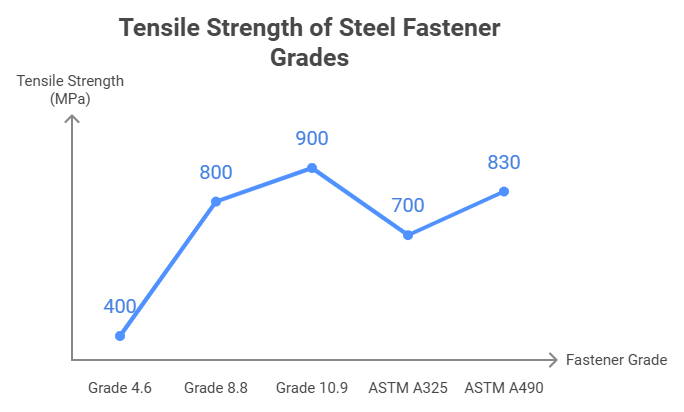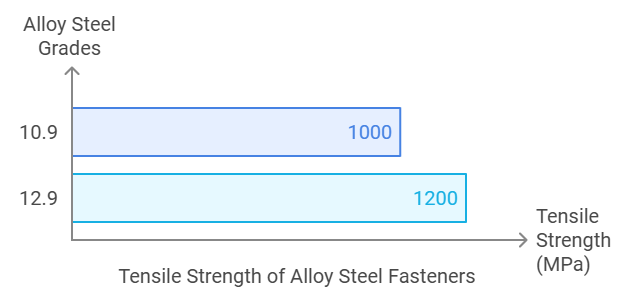The Ultimate Guide to Fastener Materials and Grades
Selecting the right fastener material is critical for the success of any project. No matter what kind of work you're doing--from construction to consumer goods--a good choice guarantees both power and durability over time. Whether you are involved in construction, machinery, or consumer goods, selecting the correct fastener ensures your work will last longer, withstand more strain, and retain its shape better.
This guide takes you through a range of fastener materials, their strength levels, and how to choose the right one for your applications. The input provided is from Husaini Brothers, an established supplier in this field.
Introduction to Fastener Materials
Not only does the choice of a fastener affect how well it performs and its strength of fastening, but also how resistant it is to corrosion, fatigue, wear, and tear.
The correct material is essential in making sure that a fastener can withstand the particular stresses of a project, work in the environment in which it must operate without deforming, and meet all operating requirements.
Well-chosen fasteners bring reliability; make the wrong choice and you could end up paying for expensive repairs.
Steel: The Workhorse of Fasteners

Steel is probably the most common material for fasteners. Carbon steel in particular offers an excellent compromise between low cost of materials and good strength. It is durable and adaptable, used across a multitude of industries--car technology as far as aerospace engineering--in general manufacturing processes too.
Carbon Steel Fastener Grades:
| Grade | Tensile Strength (MPa) | Typical Applications |
|---|---|---|
| 4.6 | 400 MPa | General purpose |
| S8.8 | 800 MPa | Construction, automotive |
| 10.9 | 900 MPa | Heavy-duty applications |
High-Strength Steel: For Demanding Applications
For projects that demand higher strength, high-tensile steels such as ASTM A325 and A490 are excellent options. These fasteners are particularly important in construction and heavy-duty applications, where structural integrity is paramount. High-strength steel fasteners are designed to withstand significant forces, making them perfect for use in bridges, buildings, and other large infrastructure projects.
High-Strength Steel Grades:
| Grade | Tensile Strength (MPa) | Typical Applications |
|---|---|---|
| ASTM A325 | 700 MPa | Structural steel connections |
| ASTM A490 | 830 MPa | Bridges, large structures |
| 8.8 | 800 MPa | Construction, heavy-duty tasks |
Stainless Steel: Fighting Corrosion

For fasteners used in settings exposed to moisture, chemicals, and temperature extremes, 316- stainless steel is the best option available. With its excellent corrosion resistance, stainless steel fasteners, especially grades 304 and 316 made of this material have played an irreplaceable part in the oil & gas industry, food processing, and other marine environments.
fasteners, especially grades 304 and 316 made of this material have played an irreplaceable part in the oil & gas industry, food processing, and other marine environments.
In harsh environmental conditions, these fasteners can not only endure but remain so with strength and good operation afterward.
Stainless Steel Grades:
| Grade | Corrosion Resistance | Typical Applications |
|---|---|---|
| 304 | Good | Food processing, architecture |
| 316 | Excellent | Marine, chemical processing |
Alloy Steel: Enhancing Strength and Durability
For challenging tasks that demand great strength and toughness, alloy steels are often employed. When elements like chromium, vanadium, molybdenum, and boron are combined with alloy steels, they can be used to produce fasteners such as socket head screws and stud bolts, which possess better mechanical properties. In high-stress situations, fasteners made of alloy steel are used.
This includes the automotive and aerospace industries, where performance under heavy loads is of prime significance.
Alloy Steel Grades:
| Grade | Tensile Strength (MPa) | Typical Applications |
|---|---|---|
| 10.9 | 1000 MPa | Automotive, construction |
| 12.9/td> | 1200 MPa | Aerospace, heavy machinery |
Knowing the Grades of Fasteners

Grades are assigned to determine the strength, hardness, and suitability for different applications of fasteners. If graded correctly, these can assist engineers in choosing the optimum fastener for a particular application.
For example, in the carbon steel fastener, one number represents its tensile strength, given in megapascals (MPa). Higher grades, such as 8.8 and 10.9, provide stronger and more durable fasteners suited to demanding applications.
To ensure that the chosen fasteners match the specifics of your project needs, such as tensile strength, impact resistance or resistance to corrosion, it is important you know these grades inside out.
Match Materials and Grades to Your Needs
Choosing the most suitable material and grade for your fasteners requires understanding what your project demands. Factors like environmental conditions, load needs and longevity all play a part in deciding that. For example, in construction, high-strength steel fasteners may be necessary for securing structural components under heavy loads.
Stainless steel fasteners are used in marine applications because they will provide needed resistance against corrosion from saltwater. Similarly, alloy steel fasteners are ideally suited where both high impact and tension are experienced. Let the experts at Husaini Brothers guide you toward the best choice.
Call to Action
Need help choosing the right fastener materials and grades for your project? Contact Husaini Brothers today! With over 55 years of experience and a vast inventory of high-quality fasteners, our expert team can provide the guidance and support you need. Visit our website or call us at +971 4 2223024 to learn more.
Read More: The Importance of Proper Fastener Installation and Maintenance
Get a Free Quote